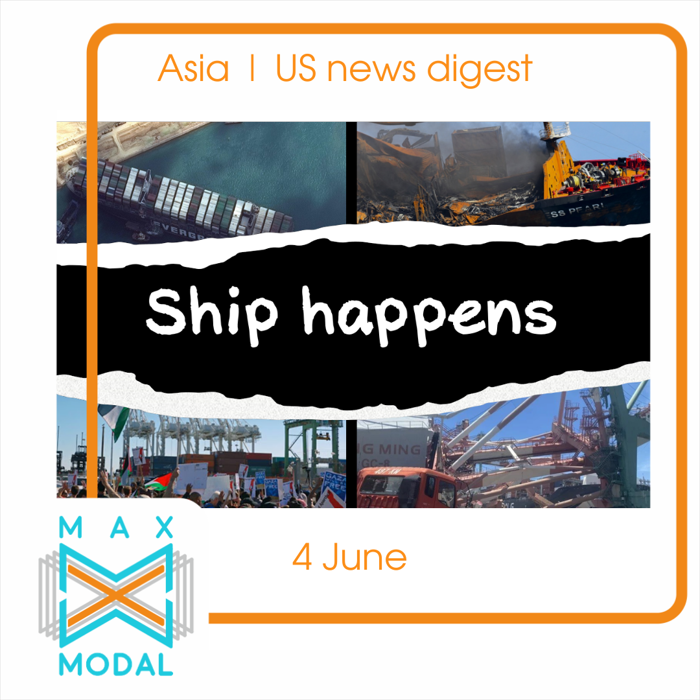Asia | US news digest. 4 June
Ship happens: misfortune never comes alone.
The soaring rates have been like a snowball – almost elementally unfolding across the industry (Asia-US West Coast prices increased by 2% to $5,494/FEU and are 236% higher than the same time last year. Asia-US East Coast prices also climbed 2% to $7,479/FEU, and are 190% higher than rates for this week last year) and consequently dragging historically high import demands. Although this week there has been a slight glimpse that the U.S. containerized imports could pull back, at least temporarily, because the trans-Pacific shipping system has bounced against its max-capacity ceiling and can no longer bear the full load, liner giant Maersk has stated that this phenomenon should not be attributed to a softening in demand. The company has also announced that the recent challenges with their booking system were not due to cyber-attacks – it was a purely technical problem. With dozens of ships remaining at anchor along the Californian coast and the blockage of important export getaway in Yantian (productivity in the eastern area of Yantian International Container Terminal (YICT) is down to 30% of normal levels) further pressure to supply chains has been added. With the congestion torturing the port operations, YICT has taken some measures to improve the current situation: acceptance of export-laden containers has resumed from 00:00 AM on 31 May but with certain exceptions. The slots are now only available for containers within three days of a vessel’s estimated time of arrival, and only after the terminal confirms the reservation made by trucking companies for laden container gate-in. The rule imposes at least another week of delays, forcing carriers to bypass the port. One more blockage has occurred this week. Pro-Palestinian protestors, led by the San Francisco-based Arab Resource & Organizing Center (Aroc), have claimed victory in turning a ZIM ship away from the Port of Oakland in California. The organization’s ‘Block the Boat’ campaign aims to prevent Israeli ship operator Zim Integrated Shipping Services from docking anywhere during an ‘International Week of Action’ that will end on June 9.
Life is not easy for the shippers using the North Atlantic trade lanes either as they have faced a sharp increase in Westbound prices(from Asia to US ports on the east as well as the west coast it rose by a relatively modest 2% last week) in response to a combination of robust demand and equipment shortages. The box ship charter market is continuing its bull run, with daily hire rates in some sectors now out of control, according to the experts. The current market reflects a rate of some $52,000 a day for a typical 4,000 teu panama which is 10 times higher than it was achieved by shipowners just five years ago. In a sign of just how frenzied the container market has become, a freight forwarder is reportedly paying $135,000 per day for a short-term charter of the S Santiago (a 15-year-old container ship with a capacity of 5,060 twenty-foot equivalent units (TEUs)). The situation makes it almost impossible for the companies to build momentum when all their assets are concentrated on staying afloat; however, one of the major players of the logistics market Mediterranean Shipping Company has procured more ultra-large containerships, as the second-largest liner operator continues its fleet expansion.
More light has been shed on the situation with the X-Press Pearl. According to the latest information from its owner’s spokesman, the smoldering wreck of it has settled onto the ocean floor after water flooded the engine room. Even though the aft of the vessel had settled on the seabed, the forward portion of the ship was still afloat and the crew had hoped to move the ship away from the Sri Lankan coastline. They have failed the attempts. This incident has demonstrated the need for ensuring the safe transport of dangerous cargo. In particular, the TT Club has been campaigning to reduce the number of these life-threatening, cargo- and ship-damaging, environmentally impactful and highly costly events for a while now. Although the owner of the X-Press Pearl has insisted there is currently no sign of pollution as the vessel starts to sink, the local government has voiced its concerns. Misfortune never comes alone, says a famous proverb - the 8,500TEU OOCL Durban has crashed with the No. 70 Yangming Wharf bridge crane at the Port of Kaohsiung in Taiwan causing two cranes to collapse on the spot. One port worker suffered minor injuries in the accident. Several more were trapped but were later freed uninjured. As for Evergreen that is stuck in Suez Canal, the deal has not been resolved, but as one of the positive outcomes, the blockage has encouraged some of the companies to put their products on Eurasian rail tracks for the first time.
Experts are keeping an eye on the rail industry, voicing concerns about whether the problems with American railroads can be related to low staffing. These service issues, at least to some extent, have been related to workforce reductions caused by the pandemic and its repercussion. The US rail volumes have been going strong. For the week ended 29 May, the AAR reported rail carloads 27.2% higher than a year ago, forcing the SITC Container Lines to place more vessel orders. The air industry is also expecting a splurge in demand - Unique Logistics has booked dozens of Asia cargo jets for peak season.
Tough times create more room for collaborative efforts: the logistics arm of the Alibaba Group has signed a deal with the Korea SMEs and Startups Agency (KOSME) to serve as a third-party logistics provider for affiliated small and midsize exporters shipping to China.

